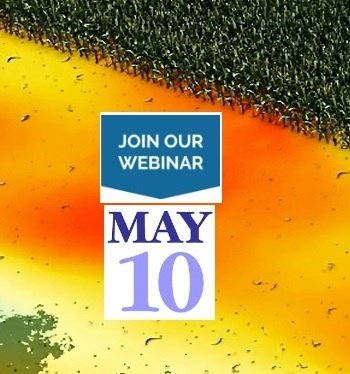Join Free Webinar : How much data is enough in Precision Agriculture?


Dear AIMS Users and Visitors!
We are pleased to invite you to attend an upcoming webinar:
HOW MUCH DATA IS ENOUGH IN PRECISION AGRICULTURE?
as part of the AIMS@Webinars series |
DATE: | Wednesday May 10th, 2017 |
TIME: | |
TARGET AUDIENCE: | The webinar is open to all We welcome questions and suggestions at: AIMS@fao.org |
To PARTICIPATE: | SEND YOUR REQUEST at: AIMS@fao.org containing: Subject: AIMS@Webinar_BDI Your Name: Your e-mail: Affiliation: |
LINK TO THE WEBINAR ROOM | |
Once registered, you will receive an email confirming your registration for the Webinar, along with the link to webinar and login instructions. | |
PRESENTERS: | Dr. Mike Duncan, Natural Sciences and Engineering Research Council of Canada (NSERC) Sarah Lepp, Senior Research Associate, Agriculture & Environmental Technologies Innovation Centre Gregor MacLean, Research Project Manager, Agriculture & Environmental Technologies Innovation Centre |
CONTEXT:
The Niagara College (NC) Agriculture & Environmental Technologies Innovation Centre team is led by Dr. Mike Duncan. The team is providing a webinar to discuss its most exciting areas of applied research. Attend the webinar to learn more about the tools, data analysis work, partnership, and collaboration opportunities.
1. Vineyard and Orchard Precision Agriculture – Our first work in precision agriculture was real-time temperature data collection and analysis to track and accurately identify potentially damaging weather events in cold grapevine and orchard regions. This work was developed with Canadian grape farmers in mind, since they face significant damage during cold snaps. Dr. Duncan developed the Shock Function to identify sharp drops in temperature that can damage or kill vines and/or buds. By identifying damaging events, grape farmers can use wind machines and other mitigation strategies to prevent or reduce significant damage.
2. Field Topography Analysis and Yield Trends - NC and Ontario Ministry of Agriculture, Food & Rural Affairs (OMAFRA) team members have done analysis on field topography and hydrology and their relationships with high and low production areas. LandMapR is an excellent software suite that has supported this work. It was developed by Dr. Bob MacMillan, Soil Pedologist, who provided the software to Niagara College, and it was open-sourced, and added to the Research Crop Portal. The team will showcase LandMapR’s outputs, and the benefits to understanding field hydrology, fertilizer applications, yield, and seeding.
3. Crop Yield Data Management and Analysis - The NC team has developed a web system called the Research Crop Portal (RCP) that manages and manipulates mapped agricultural data. Its initial development was for yield data from grain crops. The system’s data tools include cleaning, kriging/interpolation, multi-map layering, and data/trend analysis. Niagara College has developed custom algorithms that identify the repeatable high producing areas. The RCP can support farmers in creating management zones and developing variable-rate fertilizer prescriptions for their fields.
4. Dynamic Crop Tracking System - Under development are high resolution autonomous sensor systems, and ground rovers. The dynamic inputs to growing crop fields define how the final yield maps will look, and the amplitudes that they carry. Our vineyard work on data analysis will find a new home delineating the dynamics within which crops grow. Data ranging from rainfall, to wind, to heat units, to soil parameters are all required, and the ultimate question is how much data is enough data?
ABOUT SPEAKERS:
Dr. Mike Duncan, Natural Sciences and Engineering Research Council of Canada (NSERC) Industrial Research Chair for Colleges (IRCC) in Precision Agriculture & Environmental Technologies | Dr. Duncan holds a PhD from McGill University (Agricultural Physics). Dr. Duncan joined Niagara College in 2001 to help found the Centre for Advanced Visualization (CFAV), a research group dedicated to exploring the use of virtual reality (VR) technology for urban and land use visualization and simulation. In 2006, CFAV Inc. was incorporated. Dr. Duncan then focused on precision agriculture and the use of sensor networks to monitor spatial and temporal temperature fluctuations in vineyards. Dr. Duncan's expertise centres around analyzing large volumes of data in real-time. He and his team of applied researchers won the ORION Discovery Award in 2011 for their real-time PrAgMatic system. |
Sarah Lepp, Senior Research Associate, Agriculture & Environmental Technologies Innovation Centre | Sarah is a graduate of Niagara College’s Environmental Technician program, and Brock’s Physical Geography B.Sc.. She has extensive background working with mapping and analysis, including working with Esri. Her current work involves deep analysis of farm crop yield data, topography, and hydrology (water flow). Sarah supports a team of computer programmers and GIS Technicians in developing multiple agricultural data analysis tools, including a major system called the Research Crop Portal. |
Gregor MacLean, Research Project Manager, Agriculture & Environmental Technologies Innovation Centre | Gregor is a graduate of Niagara College’s Environmental Management and Assessment graduate certificate, and Brock’s Sport Management program. He has a background in environmental consulting, program delivery, and team management. His current work involves proposal and budget creation, business development, project management, and strategic direction. |

